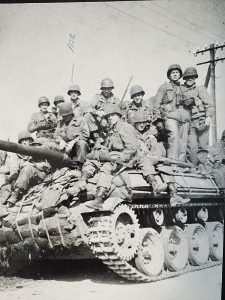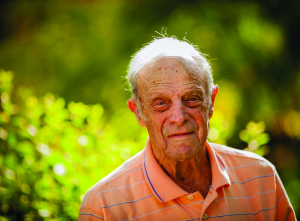
We often hear stories of World War II and all of the men that made significant contributions to our country both then and since their return to the states after the war. Although the pool of veterans from that generation is dwindling more and more as time passes, there are still a few treasures left who are still making an impact on their communities today – years after they sacrifice their time and talents in service to their country in one of the last truly global conflicts of our the modern era. Mr. Robert Senter is one of those hometown heroes.
Senter was born in Kipling in December 1923 and grew up in the Fuquay-Varina area, graduating from Lafeyette School in 1941. He met his future bride, Hilda Lee, in high school and started attending Campbell Junior College. Part way through his second year, however, he was drafted by the U.S. Army and departed for Fort Bragg in February of 1943 to serve his country overseas in the 86th Division at Camp Howze. He shipped to Gainesville, Texas where he completed both basic training and advanced training before participating in Louisiana maneuvers in anticipation of reporting to the European theater. He was then transferred to Boston, where he caught a transport to Liverpool, England and began his two-year stint in the infantry.
He was stationed in Southhampton, England until after D-Day, when his division traveled across the English Channel and onto Utah Beach in Normandy to support Allied efforts in France. For a month, he worked unloading trucks and refilling gas cans before being called up to assist the 83rd Division with 80 other soldiers. They joined the 329th regiment and went into combat with six of his fellow recruits. Over the next few months, Senter saw considerable action on the front lines as they pushed toward Germany. The terrain was rugged and gaining ground was hard work as they fought the enemy, the weather, and the wilds of rural France.
On their push toward Berlin, his unit got as far as St. Lo in Brittany before he was wounded in both shoulders and arms by a strafing gun. He was taken to Cherbourg and then flown to Bristol, England to recover. He spent several days in an Army hospital before being transferred out to make way for a train load of wounded who were being shipped in. They moved five of them, including Senter, to a nearby chapel, where they finished out their rehabilitation and passed the time folding bandages and doing other odd jobs to help out.
After he was fully recovered, the Army sent them back to France, this time via Omaha Beach in Normandy. They rejoined their outfit in Luxemburg and spent several months tromping through the through the Hurtgen Forest, where every tree was broken off halfway up and the only roads were old fire lanes. Senter participated in a number of reconnaissance missions to rescue soldiers and capture Germans, earning him a reputation for good recon work. During these months, however the atrocities he witnessed were disturbing enough that the memories stayed with him the rest of his life.
It was near the town of Birgel that he was wounded in the arm for a second time, this time by a tracer on his way into town. In the heat of battle this time, however, he was triaged at a First Aid jeep on the side of the road and got back into action almost immediately. After a few more days of serious fighting, he received a three-day pass to Brussels for some R&R, but was unlucky enough to receive it on the eve of a massive assault that took the Allies by surprise—the beginning of the Battle of the Bulge. His visit to Brussels was cut short by the Allies’ response to Hitler’s desperate last-chance effort to cut off the Allies’ advance into Germany. Robert Senter was back on the front lines that day.
His memories of the Battle of the Bulge are still very vivid. It was a six-week ordeal in the dead of winter, with the Germans using poor weather to their advantage in the Ardennes Forest. “Of 200 men who went into that battle from my division,” Senter tells us, “only 35 made it out—and only six from my squad!”
Shortly after the Allies won the Battle of the Bulge, Senter’s unit pushed through to the Rheine River and blew up a major bridge in an attempt to cut off supply routes for the German Army. It turns out it was one of their last efforts before being called home.
On April 10th, 1945—two days before President Roosevelt’s death—Robert Senter got a furlough back home to the states. He landed in Boston and spent a month at home before being shipped to Oklahoma and being assigned to the Chemical Ward battalion there. He served out the rest of his enlistment in Oklahoma, returning to North Carolina in September of 1945.
Senter received a number of accolades and commendations for his service during World War II. On his wall is a framed collection of brass and ribbons. His highest is the Silver Star, which he earned for “distinguishing himself by gallantry in action on 2 March 1045, at Neuss, Germany.” He also earned the Bronze Star, the Purple Heart, a Victory medal, a Good Conduct medal, and medals for service in the European Theater and U.S. Operations. Senter is proud of those medals, as well as his several citations from the Army.
He describes his experience in Europe from 1943-1945 as arduous. “I traveled through three countries almost completely on foot,” he explains. “I dealt with exhaustion, frostbite, and illness. I slept on the ground everywhere I went. I was wounded twice and in the two years I was over there, I probably only slept in a bed 8 or 9 times!” He was able to travel to Paris and Brussels for brief furloughs during that time, but the majority of his time in Europe was not very glamourous.
But as amazing as Senter’s story of war and service to his country through military service is, his service to his country didn’t end with the end of the war. Returning to Raleigh, he went back to college—first at Campbell and then to a technical college in Chicago. He married his high school sweetheart, Hilda, and had one son, Michael, who still lives and works in Raleigh. Senter worked in the parts and service department at Philco Corporation in Raleigh for many years before retiring.
About fourteen years ago, Senter and his wife moved back to Fuquay-Varina, where they bought a house and became very active in the community. Active in church his entire life, Senter worked with youth for 45 years and sang in the choir for 40 years. He also served as a scoutmaster for 15 years. A dedicated member of the American Legion, Senter pays his dues faithfully, but isn’t very active in the local post anymore.
What he IS active with, however, is the Fuquay-Varina Emergency Food Pantry. Senter has been a fixture on their volunteer team with them for over 12 years. At the age of 92, he still picks up donations at the local supermarkets three days a week in his truck and delivers them to the Pantry. He also helps pick up watermelons, potatoes and other food items from the experimental farm station at NC State University as part of the pantry’s gleaning program. Until recently, Senter also was an integral part of the Pantry’s “firewood ministry,” where they harvest and deliver cord wood to local families who use the wood for heat in the winter. When asked why he continues to work so hard at the age of 92, he says “It keeps me busy and gives me something to do!” Laeron Roberts with the Fuquay-Varina Emergency Food Pantry says that Senter has been one of their longest-standing and most dedicated volunteers. “He is truly a man of service in all sense of the word.”
In his spare time, Robert Senter still attends church, cuts his own lawn, and manages his life and property on a daily basis. When he’s not working for the Food Pantry and taking care of personal business, he works on jigsaw puzzles in his living room. “It keeps my brain sharp to work on puzzles,” he says. “I’m never bored.” Our community thanks Robert Senter for his service to our country during WWII and for his continued service to our community now.
